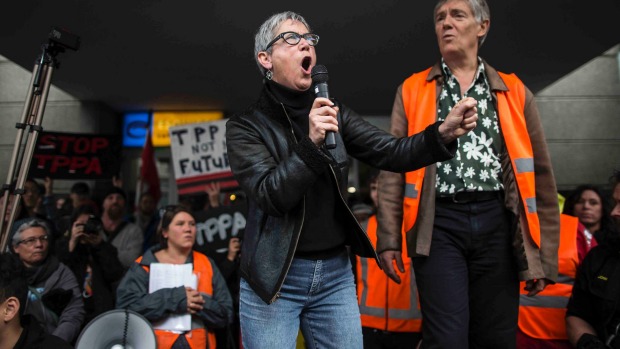TPPA debate: We need a free trade of opinions
Stuff.co.nz, New Zealand
TPPA debate: We need a free trade of opinions
By Donna Miles-Mojab
16 November 2015

Professor Jane Kelsey addresses up to 10,000 people in Auckland’s Queen Street marching in protest at the Government’s controversial Trans-Pacific Partnership agreement/Lawrence Smith
OPINION: There is a shaky YouTube video of our prime minister, John Key, explaining "the logic" behind the opposition to the Trans Pacific Partnership during a visit to Oxford in North Canterbury.
Here are his exact words:
"If you think through the logic of those great people outside [the protesters], they are proposing you carry on being in a position where the good people of Oxford can’t sell their products to the biggest economies in the world. Go figure!"
The people protesting outside the Town Hall in Oxford were not able to correct the prime minister’s misrepresentation of their position because they were not given a platform. The only thing "the good people of Oxford" heard from the opposition side of the argument was the muffled sound of their chants.
What happened in Oxford is not unique.
There has been a consistent effort to equate the call for closer public scrutiny of the TPPA to being "anti-trade".
As someone who has taken to the streets to protest against the secrecy surrounding the TPPA more than once, I can tell you that not even one fellow protester that I talked to was anti-trade; not one!
The most prominent opponent of the TPPA, Auckland University law professor, Jane Kelsey, has been described as a "Marxist" despite her clear proclamations that her views are born out of scholarly endeavours, not ideology.
The attempt to degrade independent academic analysis in this way is an effective way of limiting the oppositions’ impact on public’s perceptions but it is damaging to the health of our democracy.
Democracy is not about trusting our elected politicians to do the right thing; it is about allowing individuals to participate in the political process in meaningful ways.
Ad Feedback
The debate on the TPPA has, so far, restricted the most important free market in a representative democracy — the free market of thoughts and ideas.
A healthy democracy requires its citizens to be skeptical of those in power.
We need to test the Government’s position on the TPPA against contradicting views; that is the only way we can arrive at an informed opinion.
The TPPA is the biggest trade deal in the modern history of mankind with far reaching consequences for us, and the future generations of this country.
Our internationally recognised and highly respected public intellectuals, with relevant academic expertise in the area of international trade, should be given sufficient platform and access to all the relevant documents, to challenge the Governments’ views on the TPPA.
As ruled by the high court, our trade minister, Tim Groser, broke the law by refusing to release information on the TPPA. The refusal to release the background technical documents necessary to fully analyse the text is another stumbling block in the path of those who wish to put this important deal under closer public scrutiny.
We need engaging public debates, free from name callings and intimidation, to help us make informed decisions.
One of the most important living public intellectuals, Noam Chomsky, has rejected the TPPA as having nothing to do with "trade" and everything to do with protecting investors’ rights.
In America, presidential candidate Hillary Clinton, a champion of developing trade pacts, has declared her opposition to the TPPA. She believes the agreement would not be enough to "protect consumers from excessively high drug prices".
Many Nobel laureate economists, law experts, senior medical staff and trade experts have expressed their concerns about the TPPA too.
Professor Jane Kelsey can hold her head up. Her long-held prediction on the Government’s wishful thinking on dairy gains, as well as her other concerns, were proved right. Professor Kelsey believes that some of the excesses of the deal were cut back purely due to the pressure exerted by the anti-TPPA global movement.
It is now time for us to hear an intelligent debate around the important concerns surrounding certification, access to next-generation biologic drugs and, most importantly, the Investor State Dispute Settlement provisions in the TPPA, which will limit the ability of our government to exercise its sovereignty and pass laws that protect public interest.
Anti-TPPA supporters are not anti-trade, just as those supporting the rights of detainees at Christmas Island are not pro-rapists.
It is time for spin and PR-driven rhetoric to stop. The New Zealand public deserves to hear a robust debate on important issues facing our country without diversion and subterfuge.
Donna Miles-Mojab is a British-born, Iranian-bred, New Zealand citizen. She worked as a senior mathematics lecturer in the United Kingdom for 10 years before migrating to New Zealand as a new mother and setting up a small business in Christchurch.





